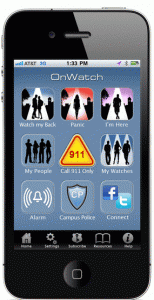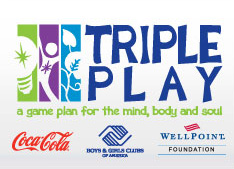December 9th, 2011 by Dr. Val Jones in News, Patient Interviews
1 Comment »
 There aren’t too many grandmothers developing mobile health apps these days, but I met a charming one (Jill Campbell) at the mHealth Summit yesterday. Jill is a 60 year-old woman from Texas who has been actively concerned for the safety of herself and her daughter over the years.
There aren’t too many grandmothers developing mobile health apps these days, but I met a charming one (Jill Campbell) at the mHealth Summit yesterday. Jill is a 60 year-old woman from Texas who has been actively concerned for the safety of herself and her daughter over the years.
“My daughter took a self-defense class,” Jill explained, “And she was taught the ‘fight or flight’ response to escape harm. I’m 60 years old. I’m not good at fighting and not very fast at fleeing. So what’s my third option?” Jill created the WatchMe 911 app to provide the solution.
“I first started thinking about a personal alarm system before smart phones even existed. I saw that there were car alarms and house alarms, and wondered why there weren’t personal alarms. At the time I imagined that the personal alarm would go through an answering service system, but since smart phones were created, it can all be tied together in an app format.”
Jill demonstrated the WatchMe 911 app to me during our interview. It contains features such as a panic button that can be armed in advance. Two taps on the smart phone screen and a circle of friends and 9-1-1 are contacted immediately with your GPS location and an alert message. The panic button is a favorite for women who are concerned for their safety when walking late at night or in dimly lit parking lots or alleys. Read more »
October 14th, 2011 by Dr. Val Jones in Announcements, Health Tips
3 Comments »
 I’m proud to have been selected as the national, nutrition (“mind”) coach for the Boys & Girls Clubs’ Triple Play Fit Family Challenge. This is a 6-week challenge – five families (you can meet the families on the Fit Family Challenge blog) will compete for a grand prize: an all-expenses-paid vacation!
I’m proud to have been selected as the national, nutrition (“mind”) coach for the Boys & Girls Clubs’ Triple Play Fit Family Challenge. This is a 6-week challenge – five families (you can meet the families on the Fit Family Challenge blog) will compete for a grand prize: an all-expenses-paid vacation!
My job is to support the families with evidence-based nutritional information that they can use to establish lifelong healthy eating patterns. Proper nutrition is one of the most critical components of preventive medicine, and can help to reduce the risk for America’s top 3 killer diseases: heart disease, cancer, and stroke (not to mention type 2 diabetes, osteoporosis, and high blood pressure). If these families help their kids to adopt healthy lifestyles now, they will have a lower lifetime risk of many major diseases. And I hope that the kids will also become evangelists for healthy eating to their peers!
I’ve been thinking a lot about what I’ve learned over the years as a nutrition journal editor, avid foodie, and rehab physician, and I think that (to begin) I can truly boil down all we know about American eating habits into these three pieces of advice (note that these are based on HHS’s Dietary Guidelines For Americans, 2010): Read more »
July 2nd, 2011 by Glenn Laffel, M.D., Ph.D. in Health Policy
No Comments »

In the 1993 film Groundhog Day, Bill Murray plays a TV weatherman who finds himself trapped in a do-loop, covering the numbingly boring display of Punxutawney Phil, over and over again.
 Forgive those of us who follow news from the Department of Health and Human Services for feeling like Bill Murray in that movie.
Forgive those of us who follow news from the Department of Health and Human Services for feeling like Bill Murray in that movie.
Last month, HHS released an action plan to reduce racial disparities in health care. The plan called for new care models, more service delivery sites, a beefed-up health and human services workforce, and targeted efforts to reduce cardiovascular disease, childhood obesity and other scourges of minority populations.
Remarkably however, the plan came with no funding. Apparently, it was supposed to prompt agencies within HHS to assure that their own internal plans were aligned with the effort to reduce racial disparities. Worse yet, the plan involved only HHS itself. In effect, it assumed that a ‘medical model’ can solve racial disparities in health care. However as I argued here, these disparities aren’t about health, at all. They are about socioeconomic status, and HHS can’t fix that by itself.
Solving the problem of racial disparities in health care clearly requires input from many branches of government, including those involved with education, urban planning, transportation and more, in addition to HHS.
When it was all said and done, the HHS plan came off looking like a political stunt by the Obama administration. While the administration probably does want to fund a bona fide effort to reduce racial disparities, today’s incessant (and appropriate) focus on deficit reduction forced the administration to release a plan with no teeth. It isn’t going to make a dent in the problem. Read more »
*This blog post was originally published at Pizaazz*
May 5th, 2011 by Steven Roy Daviss, M.D. in Health Policy, Opinion
No Comments »



 The White House released its plan last week entitled “Epidemic: Responding to America’s Prescription Drug Abuse Crisis” [LINK to pdf of this 10-page plan]. Below are some of the elements in this plan that is part of the National Drug Control Strategy (like that has worked so well :-/).
The White House released its plan last week entitled “Epidemic: Responding to America’s Prescription Drug Abuse Crisis” [LINK to pdf of this 10-page plan]. Below are some of the elements in this plan that is part of the National Drug Control Strategy (like that has worked so well :-/).
The areas of this plan involve education of prescribers and users, monitoring programs, making it easy to dispose of controlled dangerous substances (CDS for short), and enhancing enforcement. The plan establishes thirteen goals for the next five years, and also creates a coordinating body, the Federal Council on Prescription Drug Abuse, to oversee and coordinate it all.
If any of our readers have comments on specific items (I’ve numbered them for ease of reference), including unintended (or even intended) consequences, please chime in.
- EDUCATION
- require training on responsible opiate prescribing
- require Pharma to develop education materials for providers and patients
- require professional schools and organizations to include instruction on balancing use of opiates for pain while reducing abuse
- require state licensing boards to include relevant ongoing education in their licensure requirements
- help ACEP develop guidelines for opiate prescribing in the Emergency Department [this should be a big help]
- increased use of written patient-provider agreements
- facilitate public education campaigns, especially targeting parents
- encourage research on low-abuse potential treatments, epidemiology of substance abuse, and abuse-deterrent formulations Read more »
*This blog post was originally published at Shrink Rap*
April 20th, 2011 by Stanley Feld, M.D. in Health Policy, Opinion
No Comments »

In 2009 President Obama stated that Accountable Care Organizations (ACOs) were going to be pilot programs in real world settings. The goal was to see if they effective in reducing costs and increasing “quality of care.” The results of the pilot programs have not been published.
Last week despite the lack of proof of concept HHS and CMS announced new proposed regulations for ACOs.
The new delivery and payment model the agency estimates could serve up to 5 million Medicare beneficiaries through participating providers, and also potentially save the Medicare program as much as $960 million over three years.
How were these estimates derived? It could be another accounting trick by President Obama’s administration.
The idea of coordinating care and developing systems of care is a great idea theoretically. From a practical standpoint, execution is very difficult.
I tried to execute something similar in 1996 with the American Association of Clinical Endocrinologists; a national Independent Practice Association. AACECare received little cooperation or interest from Clinical Endocrinologists.
The problem is coordinated medical care is dependent on physicians cooperating and not competing with each other. It also depends on hospital systems developing an equitable partnership with physicians.
The equitable partnerships between hospital systems and physicians are difficult to achieve if past results are any indication of future results. Read more »
*This blog post was originally published at Repairing the Healthcare System*
 There aren’t too many grandmothers developing mobile health apps these days, but I met a charming one (Jill Campbell) at the mHealth Summit yesterday. Jill is a 60 year-old woman from Texas who has been actively concerned for the safety of herself and her daughter over the years.
There aren’t too many grandmothers developing mobile health apps these days, but I met a charming one (Jill Campbell) at the mHealth Summit yesterday. Jill is a 60 year-old woman from Texas who has been actively concerned for the safety of herself and her daughter over the years.
















